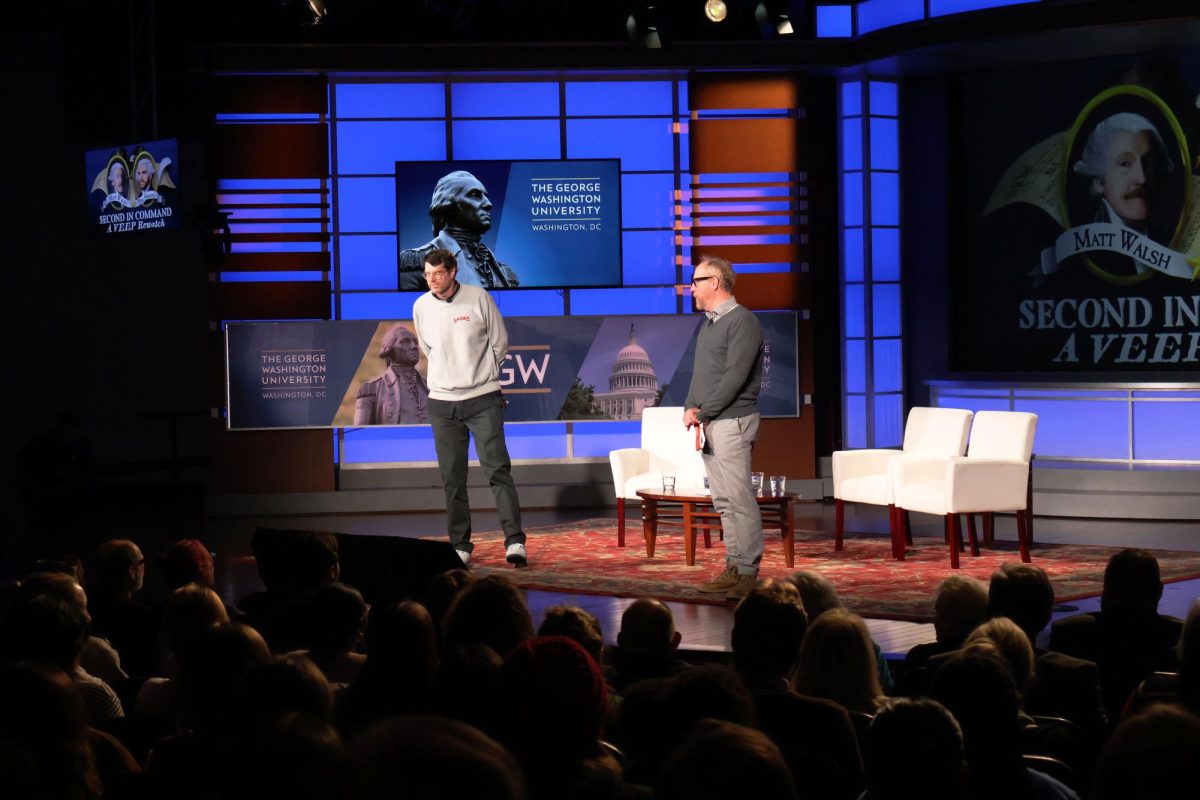Actors from the television series “VEEP” and political advocates discussed the show and national efforts to increase transparency from politicians in a live recording of the actors’ podcast at the Jack Morton Auditorium on Tuesday.
Actors Matt Walsh and Tim Simons hosted a live recording of their podcast, “Second in Command: A VEEP Rewatch,” where they discussed their experience filming the show and how national organizations are encouraging people to vote in the upcoming election with “VEEP” Actor Tony Hale, three political advocates and a former capitol police officer. The event, subtitled “Democracy in America,” was hosted by the School of Media & Public Affairs and interlaced commentary on political organizations’ outreach efforts with “VEEP” actors’ takeaways from the show.
“VEEP,” which HBO aired from 2012 to 2019, centers around a fictitious U.S. vice president and her office staff, who use comedy-style acting to depict their work at the White House. The show ran for seven seasons and received 17 Emmy Awards.
The podcast, which Walsh and Simmons launched in 2021, takes the listener through an episode of “VEEP” as Walsh and Simons reminisce over their experiences on the show and dissect the episode’s content. The podcast has covered all seven seasons of the show and often features other “VEEP” stars including actors like Julia Louis-Dreyfus and Randal Park.
University President Ellen Granberg introduced the event and said one of GW’s main objectives has “always been” to foster conversation around politics, civic engagement and democracy.
“As one of the most politically engaged universities in the nation, there is no better place to learn, to debate, to engage with the democratic process, because here at GW we don’t just study democracy. We live it,” Granberg said.
Walsh and Simons opened the show by interacting with the audience, telling jokes and asking students about their political internships. The hosts then welcomed a group of political activists to the stage and asked them to speak about the purpose of their organizations.
Virginia Kase Solomón, president of Common Cause — an organization dedicated to upholding the values of American democracy — said her organization works to protect voting rights, quell disinformation and hold officials accountable to ethical concerns regarding issues like officials accepting expensive gifts from people or groups with political motives.
“We were actually founded to be the people’s lobby here in D.C., to make sure the average everyday people had a voice in our democracy,” Solomón said.
Tiffany Muller, president of End Citizens United, said her organization’s goal is to eliminate “big money” in politics and assure the government works for every citizen, not just those who can “write the biggest check.” Muller said End Citizens United takes issue with the power imbalance in Washington because corporations with more money are often able to influence politicians more than other groups and citizens.
“We want to get big money out of politics,” Muller said. “We want to clean up the corruption. We want to expand and protect the freedom to vote, and we want to give power back to where it belongs, to all of you, to the people.”
Hale, who played the vice president’s assistant on “VEEP,” said although he was not interested in politics before the show, he has since gained an appreciation for government officials because acting like he was doing the job gave him a glimpse into how difficult the work actually is.
“With the position that you guys are put in to see behind the scenes making these massive decisions, but you’re human beings, and you’re being put on this pedestal to do all this stuff, and it’s a lot of weight that you have to carry,” Hale said.
Simons said after the podcast’s hosts rewatched all of the episodes, they turned the series into a “regular” comedy podcast, with guests and discussions on various topics. He said he is still “shaking off some rust” when it comes to the new format, which includes new segments like games and a wider range of discussion topics.
Walsh, Simons and Hale then brought out Harry Dunn — a former capitol police officer who served on the Capitol Police force during the insurrection on Jan. 6, 2021 — to discuss his experience defending the Capitol on the day of the insurrection.
Dunn said although he and his coworkers are often hailed for saving democracy that day, their primary objective was to make it home that night.
“A lot of people praised me, my coworkers, for saving democracy. We were just trying to go home,” Dunn said. “I mean, a hell of a byproduct of saving democracy, right?”
The hosts concluded the show with Amy Cohen, Assistant Vice Provost and Executive Director of GW’s Nashman Center for Civic Engagement and Public Service, who said GW students vote at a higher rate than the national voting rate for college students — 69 percent compared to 66 percent, respectively.
“We have to stand in that value as our democracy, and we have to protect and defend the civil right of voting,” Cohen said.
In an interview after the show, Walsh said he is glad people are getting interested in politics through shows like “VEEP” and other political comedy series, but that watching shows should only be the beginning of people’s political awareness. He said he hopes the show created “positive change” and continues to encourage people to vote and engage in politics.
“I think however people can dial into what’s happening, and if comedy makes it more palatable, I guess it’s good. But I mean, it’s not a real understanding of politics, not a real understanding of the issues,” Walsh said. “But if it’s an entree into it and engages people in the process, then it’s good.”





